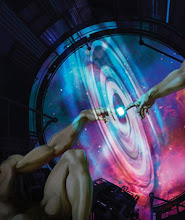The same can be said of the Holy Spirit's capacity to move through the worship of the saints. If all it takes is 10 seconds of CBN to bring on the water works, you know that you've just found yourself in a radiant bath of eternal grace and unfailing love. Though the Holy Spirit cannot be seen with regular eyes, He moves on both a global scale and a personal scale. We don't have a ticking Geiger counter to detect the Holy Spirit's presence, but there are other ways.
These passages can be confusing or even a source of annoyance, disappointment and pain to many. The uncany irony here, however, is that it is only after the experience of a bath in the radiant and saving grace and unfailing love of our saviour through the Holy Spirit that these passages become as clear as the sky is blue.
It is of the Lord’s mercies that we are not consumed, because his compassions fail not. - (Lamentations 3:22 [KJV])
The LORD is nigh unto them that are of a broken heart; and saveth such as be of a contrite spirit. - (Psalms 34:18 [KJV])
Come to me, all who labor and are heavy laden, and I will give you rest. Take my yoke upon you, and learn from me, for I am gentle and lowly in heart, and you will find rest for your souls. For my yoke is easy, and my burden is light. - (Mathew 11:28-30 [KJV])
If it be so, our God whom we serve is able to deliver us from the burning fiery furnace, and he will deliver us out of thine hand, O king. (Daniel 3:17 [KJV])
For in that he himself hath suffered being tempted, he is able to succour them that are tempted. - (Hebrews 2:18 [KJV])
Wherefore he is able also to save them to the uttermost that come unto God by him, seeing he ever liveth to make intercession for them. - (Hebrews 7:25 [KJV])
Your love, LORD, reaches to the heavens, your faithfulness to the skies. Your righteousness is like the
highest mountains, your justice like the great deep. You, LORD, preserve
both people and animals. How priceless is your unfailing love, O God! People take refuge in the shadow of your wings. - (Psalms 36:5-7 [NIV])
What often struck me as alien about these verses is the precedent. Why would a deity be bothered? Let's not forget that the eye-witnesses attest to Christ's compassion (Mark 6:34). I believe the linchpin is in the verse following Hebrews 7:25:
For such an high priest became us, who is holy, harmless, undefiled, separate from sinners, and made higher than the heavens; - (Hebrews 7:26 [KJV])
The key words are "He became us." But as I said before, this doesn't make sense until after taking a bath in the grace of God. It's a complete waste of time trying to figure this out cerebrally. Instead, give yourself permission to take off the radiation suit and step outside into the radiant bath of eternal grace and unfailing love.
